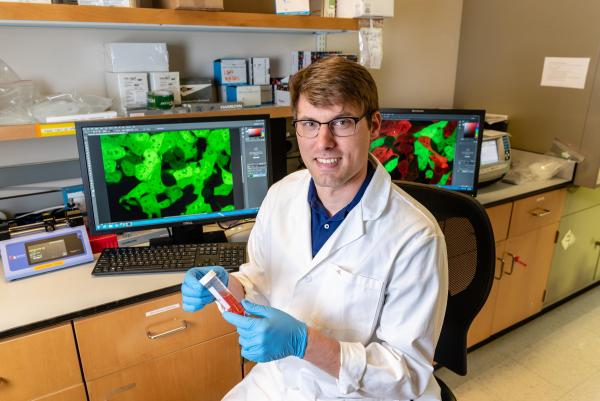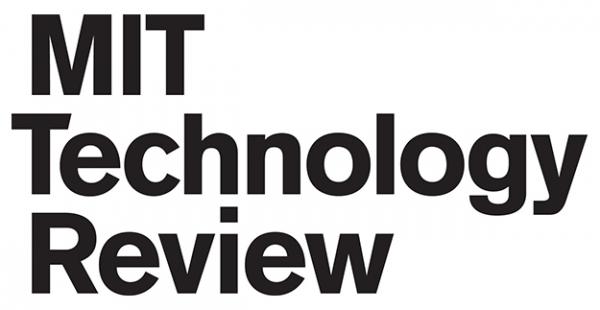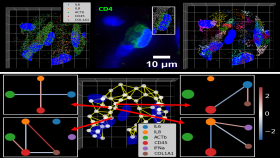James Dahlman, assistant professor in the Wallace H. Coulter Department of Biomedical Engineering at Georgia Tech and Emory University, and a researcher in the Petit Institute for Bioengineering and Bioscience, has been named to MIT Technology Review’s prestigious annual list of Innovators Under 35.
Dahlman is a bioengineer working at the interface of nanotechnology, gene editing, and genomics. His lab develops novel ‘big data’ technologies and applies them to the study of nanomedicine. One such application is the use of DNA barcodes to track thousands of nanoparticles directly in vivo; typically, labs will study a few nanoparticles in vivo.
His lab also has pioneered the use of DNA barcoded nanoparticles, and is using this powerful new technology to design nanoparticles that deliver genetic drugs to target tissues. He has designed nanoparticles that deliver RNA drugs to blood vessels; these nanoparticles have worked in more than 20 labs and are under consideration for clinical development. At the age of 31, he already has published in Nature Nanotechnology (twice), Nature Biotechnology, Cell, Nature Cell Biology, Science Translational Medicine, PNAS (twice), JACS, and other prestigious journals.
In addition to the Technology Review honor, Dahlman has won many national and international awards, and since 2014, has given dozens of invited talks at leading universities around the world on drug delivery and DNA barcoding.
For more than a decade, Technology Review has recognized exceptionally talented technologists whose work has great potential to transform the world. Previous Innovators Under 35 include Larry Page and Sergey Brin, the cofounders of Google, Mark Zuckerberg, the cofounder of Facebook, Helen Greiner, the cofounder of iRobot, and Jonathan Ive, the chief designer of Apple.
Gideon Lichfield, editor-in-chief of MIT Technology Review, said: “MIT Technology Review inherently focuses on technology first - the breakthroughs and their potential to disrupt our lives. Our annual Innovators Under 35 list is a chance for us to honor the outstanding people behind those technologies. We hope these profiles offer a glimpse into what the face of technology looks like today as well as in the future.”
Learn more about this year’s honorees on the MIT Technology Review website here and in the July/August print magazine, which will hit newsstands worldwide on July 3. The honorees are also invited to appear in person at the upcoming EmTech MIT conference, MIT Technology Review’s flagship event exploring future trends and technologies that will impact the global economy, happening September 11-14, 2018 in Cambridge, Massachusetts.
About MIT Technology Review
Founded at the Massachusetts Institute of Technology in 1899, MIT Technology Review is a world-renowned, independent media company whose insight, analysis, reviews, interviews and live events explain the commercial, social and political impact of new technologies. MIT Technology Review derives its authority from the world's foremost technology institution and from its editors' deep technical knowledge, capacity to see technologies in their broadest context, and unequaled access to leading innovators and researchers. MIT Technology Review’s mission is to bring about better-informed and more conscious decisions about technology through authoritative, influential and trustworthy journalism.
Media Contact
Jerry Grillo
Communications Officer II
Parker H. Petit Institute for
Bioengineering and Bioscience
Keywords
Latest BME News
Commercialization program in Coulter BME announces project teams who will receive support to get their research to market.
Courses in the Wallace H. Coulter Department of Biomedical Engineering are being reformatted to incorporate AI and machine learning so students are prepared for a data-driven biotech sector.
Influenced by her mother's journey in engineering, Sriya Surapaneni hopes to inspire other young women in the field.
Coulter BME Professor Earns Tenure, Eyes Future of Innovation in Health and Medicine
The grant will fund the development of cutting-edge technology that could detect colorectal cancer through a simple breath test
The surgical support device landed Coulter BME its 4th consecutive win for the College of Engineering competition.
New research from Georgia Tech helps doctors predict how therapies will interact with a child's immune system, potentially improving outcomes and reducing risks.









